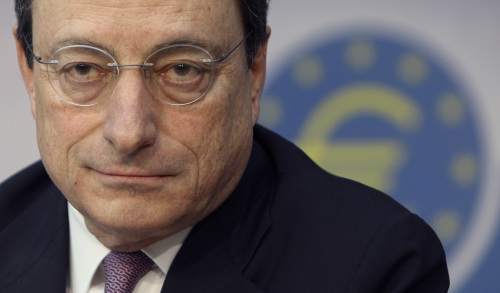FRANKFURT, Germany (AP) ― The European Central Bank saw no need to take any further action to help stabilize Europe’s financial crisis Thursday as president Mario Draghi told governments and banks that, following the 1 trillion-plus euro offer of low interest loans, the burden of fighting the problem was now on them.
The ECB’s 23-member governing council, as expected, left its benchmark refinancing rate for the 17 countries that use the euro unchanged at a record low of 1 percent, where it has been since quarter-point rate cuts in November and December.
The bank also gave no hint that more emergency measures were on the horizon in the wake of its cheap three-year loan offerings of $648 billion in December and $702 billion in February, widely credited with stabilizing markets.
The ECB, national governments and the European Union have been struggling to contain the crisis of countries holding too much debt. Governments are being pressed to cut deficits and the EU is pushing shaky banks to add to their financial buffers against losses stemming from the crisis.
The ECB’s loan offerings have been praised for easing bank finances and preventing a looming credit crunch for businesses that would have severely worsened a mild economic downturn.
Additionally, some of the banks used the ECB loans to buy government bonds. That brought down borrowing costs for indebted governments such as Italy and Spain. That indirect support was crucial because it is high borrowing costs that pushed Greece, Ireland and Portugal to seek international bailout loans.
The ECB’s 23-member governing council, as expected, left its benchmark refinancing rate for the 17 countries that use the euro unchanged at a record low of 1 percent, where it has been since quarter-point rate cuts in November and December.
The bank also gave no hint that more emergency measures were on the horizon in the wake of its cheap three-year loan offerings of $648 billion in December and $702 billion in February, widely credited with stabilizing markets.
The ECB, national governments and the European Union have been struggling to contain the crisis of countries holding too much debt. Governments are being pressed to cut deficits and the EU is pushing shaky banks to add to their financial buffers against losses stemming from the crisis.
The ECB’s loan offerings have been praised for easing bank finances and preventing a looming credit crunch for businesses that would have severely worsened a mild economic downturn.
Additionally, some of the banks used the ECB loans to buy government bonds. That brought down borrowing costs for indebted governments such as Italy and Spain. That indirect support was crucial because it is high borrowing costs that pushed Greece, Ireland and Portugal to seek international bailout loans.

Draghi told reporters Thursday that the loans had been “an unquestionable success” in shoring up banks and restoring confidence. “The risk environment has improved enormously,” he said.
Of the 800 banks taking loans in February, more than half ― 460 ― were from Germany and many were small in size. Getting money to smaller lenders was a goal of the second round of loans because those banks are likely to lend to the small businesses that provide most of the jobs in the eurozone.
“This money is now closer to the small and medium-sized enterprises than it was before,” Draghi said. “I am not saying this money will necessarily go to SMEs, but at least it is one step closer.”
Now, he said, “the ball is in the governments’ and especially the other actors’ court, to continue their reforms and repair their balance sheets, the banks especially, so they can support the recovery.”
The bank indicated that that making loans available and cutting interest rates will not be enough to solve the crisis, and turned up the pressure on governments to act.
That was reinforced by Draghi’s warning that inflation will remain over the bank’s goal of just under 2 percent into 2013. Lower interest rates can cause prices to increase, and Draghi’s comments led some analysts to say the bank might not touch rates again until sometime next year.
Draghi said keeping inflation expectations under control was “of the essence” and made several references to the bank’s mandate from the basic EU treaty of keeping inflation under control as its primary goal.
“Draghi stressed very clearly that ECB liquidity alone cannot solve the crisis and it is now up to goverments to build on this improved market mood by adopting the needed structural reforms,” wrote Marco Valli, chief eurozone economist at UniCredit, in a research note.
“In other words, the ECB has done enough and the ball is now back in the politicians’ court.”
Draghi, meanwhile, downplayed news reports that Jens Weidmann, the head of Germany’s Bundesbank and a member of the ECB rate council, has expressed concern about the looser collateral requirements that allowed more banks to take up the cheap three-year loans.
Draghi said the collateral risks concerned all the board members and that “we are all in the same boat.” He said risks were being managed by taking large haircuts on collateral ― that is, only lending a fraction of the collateral’s face value to insure the ECB against loss in case the borrower bank does not repay the money.
-
Articles by Korea Herald










![[Robert J. Fouser] Social attitudes toward language proficiency](http://res.heraldm.com/phpwas/restmb_idxmake.php?idx=644&simg=/content/image/2024/05/16/20240516050799_0.jpg&u=)
![[Graphic News] How much do Korean adults read?](http://res.heraldm.com/phpwas/restmb_idxmake.php?idx=644&simg=/content/image/2024/05/16/20240516050803_0.gif&u=)






![[Herald Interview] Byun Yo-han's 'unlikable' character is result of calculated acting](http://res.heraldm.com/phpwas/restmb_idxmake.php?idx=652&simg=/content/image/2024/05/16/20240516050855_0.jpg&u=)
